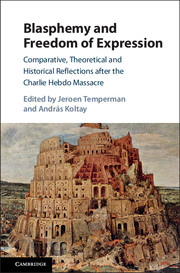49 results
Blasphemy and the European Court of Human Rights: A Small Step Forward, a Giant Leap Back
- from PART III - CoE
-
-
- Book:
- European Yearbook on Human Rights 2019
- Published by:
- Intersentia
- Published online:
- 24 January 2020
- Print publication:
- 31 October 2019, pp 221-236
-
- Chapter
- Export citation
Introduction
-
-
- Book:
- Blasphemy and Freedom of Expression
- Published online:
- 13 November 2017
- Print publication:
- 16 November 2017, pp 1-22
-
- Chapter
- Export citation
Part VIII - The Future of Blasphemy Laws?
-
- Book:
- Blasphemy and Freedom of Expression
- Published online:
- 13 November 2017
- Print publication:
- 16 November 2017, pp 643-718
-
- Chapter
- Export citation
Contents
-
- Book:
- Blasphemy and Freedom of Expression
- Published online:
- 13 November 2017
- Print publication:
- 16 November 2017, pp v-viii
-
- Chapter
- Export citation
Part II - The Right to Blaspheme
-
- Book:
- Blasphemy and Freedom of Expression
- Published online:
- 13 November 2017
- Print publication:
- 16 November 2017, pp 85-134
-
- Chapter
- Export citation
Part VI - Dormant Blasphemy Laws
-
- Book:
- Blasphemy and Freedom of Expression
- Published online:
- 13 November 2017
- Print publication:
- 16 November 2017, pp 429-550
-
- Chapter
- Export citation
Copyright page
-
- Book:
- Blasphemy and Freedom of Expression
- Published online:
- 13 November 2017
- Print publication:
- 16 November 2017, pp iv-iv
-
- Chapter
- Export citation
Part I - The Case of Charlie Hebdo
-
- Book:
- Blasphemy and Freedom of Expression
- Published online:
- 13 November 2017
- Print publication:
- 16 November 2017, pp 23-84
-
- Chapter
- Export citation
Index
-
- Book:
- Blasphemy and Freedom of Expression
- Published online:
- 13 November 2017
- Print publication:
- 16 November 2017, pp 719-750
-
- Chapter
- Export citation
Part III - On Western Legal Discourse against Blasphemy Laws
-
- Book:
- Blasphemy and Freedom of Expression
- Published online:
- 13 November 2017
- Print publication:
- 16 November 2017, pp 135-256
-
- Chapter
- Export citation
Part IV - European Court of Human Rights and Blasphemy
-
- Book:
- Blasphemy and Freedom of Expression
- Published online:
- 13 November 2017
- Print publication:
- 16 November 2017, pp 257-314
-
- Chapter
- Export citation
Part VII - Recently Abrogated Blasphemy Laws
-
- Book:
- Blasphemy and Freedom of Expression
- Published online:
- 13 November 2017
- Print publication:
- 16 November 2017, pp 551-642
-
- Chapter
- Export citation
Part V - Active Blasphemy/Religious Defamation Laws
-
- Book:
- Blasphemy and Freedom of Expression
- Published online:
- 13 November 2017
- Print publication:
- 16 November 2017, pp 315-428
-
- Chapter
- Export citation
10 - ‘Mother of God, Drive Putin Away’
- from Part IV - European Court of Human Rights and Blasphemy
-
-
- Book:
- Blasphemy and Freedom of Expression
- Published online:
- 13 November 2017
- Print publication:
- 16 November 2017, pp 294-314
-
- Chapter
- Export citation
Foreword
-
- Book:
- Blasphemy and Freedom of Expression
- Published online:
- 13 November 2017
- Print publication:
- 16 November 2017, pp xvii-xx
-
- Chapter
- Export citation
Notes on Contributors
-
- Book:
- Blasphemy and Freedom of Expression
- Published online:
- 13 November 2017
- Print publication:
- 16 November 2017, pp ix-xvi
-
- Chapter
- Export citation

Blasphemy and Freedom of Expression
- Comparative, Theoretical and Historical Reflections after the Charlie Hebdo Massacre
-
- Published online:
- 13 November 2017
- Print publication:
- 16 November 2017
Part IV - Judging incitement
-
- Book:
- Religious Hatred and International Law
- Published online:
- 05 October 2015
- Print publication:
- 09 October 2015, pp 205-314
-
- Chapter
- Export citation
2 - Pre-ICCPR developments
- from Part I - The genesis of the prohibition of religious hatred constituting incitement in international law
-
- Book:
- Religious Hatred and International Law
- Published online:
- 05 October 2015
- Print publication:
- 09 October 2015, pp 17-30
-
- Chapter
- Export citation
Foreword
-
- Book:
- Religious Hatred and International Law
- Published online:
- 05 October 2015
- Print publication:
- 09 October 2015, pp xiii-xiv
-
- Chapter
- Export citation



